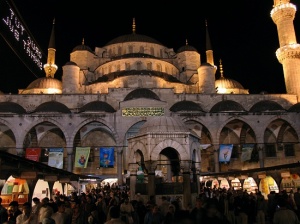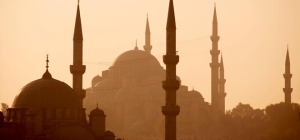Jihad H Brown – 28 August
In the collection of Al-Bayhaqi, the Prophet refers to Ramadan as a month “the first of which is compassion, the middle of which is forgiveness, and the end of which is freedom from the fire”.
Compassion is a sympathetic consciousness of another’s distress coupled with a desire to alleviate it. Mercy, another word commonly used in the same context, implies forgoing punishment even when justice demands it, or lenient compassionate treatment.
But how is a month mercy? What is the nature of its source, the mercy of Allah? How does this extend to the compassion of His subjects, one for another? And how does all of it form an integrated whole, or a closed system?
In Ramadan, we are informed in the soundest narrations that on the first night the sky is opened and the gates of the hellfire are locked. The doors to paradise are flung wide and the demons are bound and shackled. It is a month in which sins are forgiven, prayers are answered and all colours of goodness are on tap. It is a season of worship and devotion, the promised rewards for which are doubled.
The mercy of Allah is an expression of the giving, the blessings, and the generosity that He pours over His devotees in this month. In the Quran He says: “My mercy encompasses everything”; and the pious used to call out, reminding Him, ‘O Allah! I am a thing!’
In the chapter of “the Cattle”, he says: “And your Lord has prescribed mercy upon Himself.” The rain is employed as a metaphor for His grace that He sends out even after people have despaired of its arrival.
In the chapter of “Rome”, he says: “Do you not see the effects of the ‘mercy’ of Allah, how he resuscitates the earth after it was dead?”
The hearts of people that have been lost in the dry barrenness of materiality are like the earth in autumn and winter, awaiting a spring of awakening in Ramadan.
Gratefulness for these blessings entails that the hearts of the faithful overflow in return with fraternal compassion for other human beings and sentient life.
Giving and catering to needs unmet is a sign that compassion has taken up residence in the heart. The fasting person has tasted hunger and thirst and experienced difficulty and deprivation. Empathy is one of the fruits of fasting that people can share with one another.
The current healthcare crisis being hotly debated in the United States marks a decisive deficit in compassion.
Some 47 million Americans do not have health care and many who do have a boat are insisting that the others should be left in the water. It’s not their problem that others less industrious than themselves couldn’t find a way to stay dry.
The fruit of the tree of individualism can be bitter. The myopia of parochialism and the fetters of xenophobia prevent us from comprehending that other less prosperous nations have sorted out ready solutions in which all boats rise.
The Prophet said that mercy is not removed from the heart of anyone but the wretched.
In the celebrated hadith designated as the first to be taught to any student of Sacred Law, the Prophet says: “Those who show compassion to others will be shown mercy. Have compassion for those in the earth, and those in the heavens will show compassion to you.”
Shaykh Jihad delivers the Friday sermon at the Maryam bint Sultan Mosque in Abu Dhabi. For more information visit www.salaamexpat.com/abudhabi

 Shaikh Jihad H. Brown – 22 August 2009
Shaikh Jihad H. Brown – 22 August 2009 The National – Shaikh Jihad Hashim Brown – 14 August 2009
The National – Shaikh Jihad Hashim Brown – 14 August 2009
